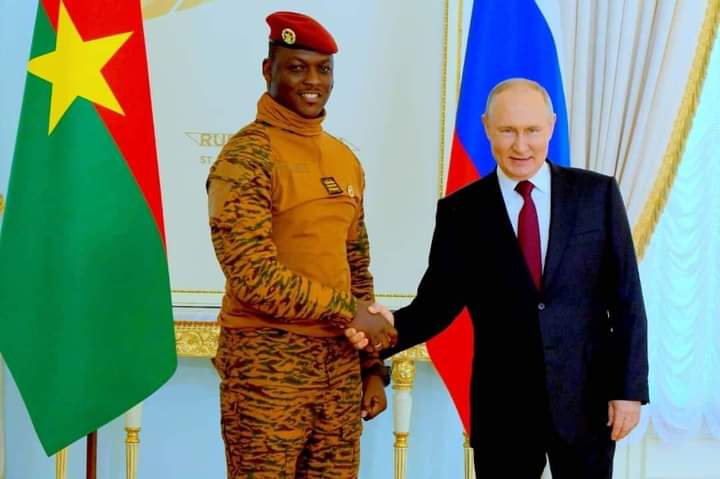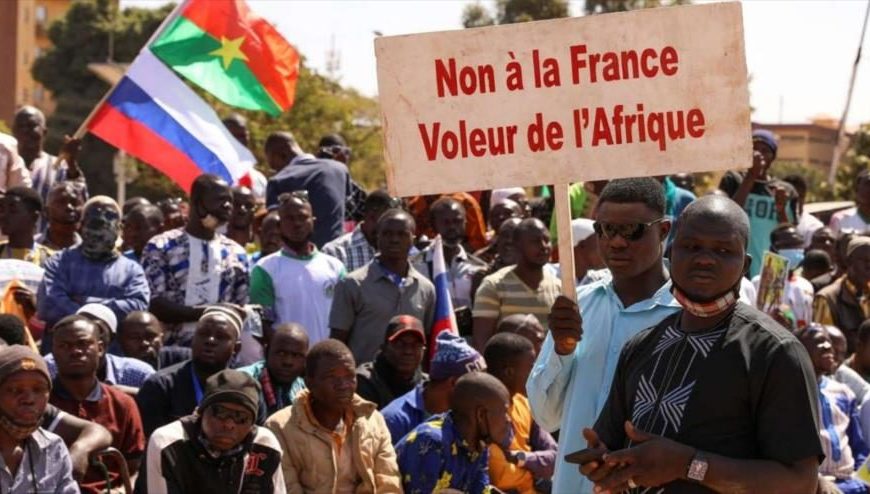Likewise, only 34 countries participated in the sanctions against Russia out of a total of 195. This tells the time of day clearly to the so-called “Western” bloc led by the United States, the United Kingdom, the European Union and the NATO member countries in particular. The Russia-Africa Summit of the Economic and Humanitarian Forum held in St. Petersburg[1] in July, showcased what Putin defines as the new multipolar order. There was a presence of 49 African countries out of 55, and the participation of 17 heads of state. In their final declaration, they vowed to fight together against neo-colonialism, against the imposition of conditions that prevent States and their peoples from deciding their own development path.
“Africa We Want” – the ‘Agenda of the African Union’ – is a whole program aimed at resolving the problems of the poorest countries in Africa: food security, energy security, resources security. Imperialism is incapable of helping these countries without exploiting for itself the mineral resources to be found there. It is incapable of developing the infrastructure of those countries to address the needs of the populations. Far from acting like this however, Russia has shown a capacity for real cooperation with these countries. Now it promises to raise its free delivery of cereals from 25,000 to 50,000 tonnes to countries like Burkina Faso, Mali, Zimbabwe, Somalia, Eritrea, the Central African Republic.
In Africa, Russia and China contribute to the development of industries, power plants, irrigation systems, agricultural businesses, transport, as well as doctors, engineers and teachers, still in the respect of the traditions and values of each country. This is what Captain Ibrahim Traoré – the transitional president of Burkina Faso – highlighted in Saint Petersburg. His speech was very anti-colonial and anti-imperialist against the predators who are not interested in developing the countries of Africa; these keep the countries in poverty, and by every means, forcing the populations to cross the oceans at the risk of their lives. Today, the Burkinabé people are determined to fight against slavery and terrorism, and move their country forward.

Captain Ibrahim Traoré and Vladimir Putin seal cooperation agreements at Russia-Africa summit, St Petersburg, 29.7.2023.
This lack of respect from imperialism forms part of the rage growing in various countries of Africa where anti-imperialist military coups took place in the last three years, as in Mali, Guinea, Burkina Faso and Niger. These four countries were expelled from ECOWAS (Economic Community of West African States) for plans which they imposed outside the oversight, control and policies of imperialism. They were expelled for adopting other forms of democracy and solidarity, and for resisting the pressure to decree a transitional period.
African countries like Mali, Burkina Faso and now Niger, expose the fact that France never had consideration for them; it never cared for the lives of their populations, or understood their cultural identities. This is how Mali denounced, and then cancelled the independence agreements that France had signed with African countries in 1960. For such countries, these agreements continued to enable the enormous theft of their resources and raw materials, along with their subordination to imperialist power via the currency and its control as part of the ECOWAS organism.
Additionally, these African countries are now denouncing the military agreements in the region. They point to the reality of more than 10 years of French and US strategic failures in their fight against terrorism, the latter having been created by themselves and NATO when they launched military operations against Libya in 2011. Mali, Burkina Faso and Niger are three countries with French and American military bases, but these bases have now been ordered to leave.
France never dropped its neo-colonial African policy. The plan that it calls “aid to development” belongs to the strategy of control that France exercises over 14 former colonies in Africa. That plan initiated by De Gaulle on the economic, military and cultural planes, is now sustained by European Union finances. This is no aid to a real cooperation with the countries; it is only a support granted to French companies to exploit mines and raw materials in those countries, and prevent the development of revolution and communism on the continent.
A “road map of influence” is included in this imperialist strategy. In reality, this influences is about the “power” of the French Ministry for European and Foreign Affairs to intoxicate massively the African youth through university, cultural and diplomatic promotions, the sole purpose of which is to agrandize the role and significance of France.
The role of the soldiers is fundamental in the anti-imperialist struggle:
From an economic point of view, the exploitation of uranium in Niger exemplifies French policy in the former colonies. Three mines are run by the Orano group (formerly Areva) – a French multinational 90% controlled by the French State, which uses this group to operate its 18 nuclear power plants in France. But in the country of Niger, rich in uranium, oil, gold and other minerals, the population remains very poor, a large majority without access to electricity. Young people have little education, and those who have diplomas find themselves without work or future.
It is through military force that these countries of Africa are announcing their refusal to let a situation continue where imperialism uses every form of blackmail, corruption and clientelism to impose itself politically, no account taken of the interests of the population.
This forms part of the changes that are now developing around the world. These changes show that the role of the soldiers is fundamental in the anti-imperialist struggle, because to solve the problems and promote revolution, they must be incorporated into a class war.
Africa has seen many coups d’état since its independence in 1960. It has given birth to important figures like Patrice Lumumba in the Democratic Republic of Congo, who was assassinated in 1960; figures like Thomas Sankara in Burkina Faso, the Country of the Upright Men, who was assassinated in 1987. During the time of Thomas Sankara, proof was already given that Burkina Faso could progress in every way, health, literacy, nutrition, the environment, with a policy based on equitability, responsiveness and the education of the population.
After the military coups in Mali and Burkina Faso, Niger was France’s last ally. Now France cannot accept that Niger too has escaped its control in this region of the Sahel[2]. It cannot accept a loss of influence so central to its African policy[3]. This explains why Emmanuel Macron in a meeting of his Defence Council, took the side of ECOWAS, condemned the coup d’état in Niger, suspended all actions of cooperation, and endorsed ECOWAS threat of military intervention to return the ex-President Bazoum to government. Bazoum was elected in 2021, without any real support and in a parody of democratic elections. All he contributed was the continuing erosion of the public freedoms in that country from 2014 onwards. For Macron, such things represent the democracy and the constitutional order that must be preserved.
Along with Mali and Burkina Faso, Niger has now fallen victim to enormous financial and banking sanctions. Niger now suffers closed borders, interruptions in electricity supplies, threats of military intervention by ECOWAS and imperialism. In front of these attempts at the destabilisation of Niger, the other countries of Mali, Burkina Faso and Algeria have announced that they will consider themselves in direct danger should ECOWAS launch an attack. This shows how firmly the revolutionary armies of these countries hold on to their positions. They prove themselves ready to work together, to make military alliances between themselves, to fight the policies that drove them to their present situation.
With its French and North American military bases, Niger used to be a laboratory for the new strategies of imperialism in the Sahel. But this failed completely. Niger is now one of the centres of the rebellion which so greatly weakens France’s position in the region.
This situation jeopardises the entire policy of imperialism. It rebuilds the bases for a re-composition of forces in favour of important political advances in the countries of West Africa, advances that can open another dynamic throughout the continent.
Les Posadistes, 16 September 2023
Feature photo: mobilization in Burkina Faso, 15 September 2023
[1] This was the second such Summit. The First Russia-Africa Summit took place on 23-24 Oct 2019 in Sochi. This was the first time such a large-scale event had been held in the history of modern Russia, and it was unprecedented in Russian-African relations. Wikipedia.
[2] The Sahel in Africa is the geographical zone between the more humid Sudanian savannas to its south and the drier Sahara to the north.
[3] On 28 July 2023, the soldiers of general Abdul Tchiani overthrew Mohamed Bazoum, the old ally of French imperialism in Niger.













